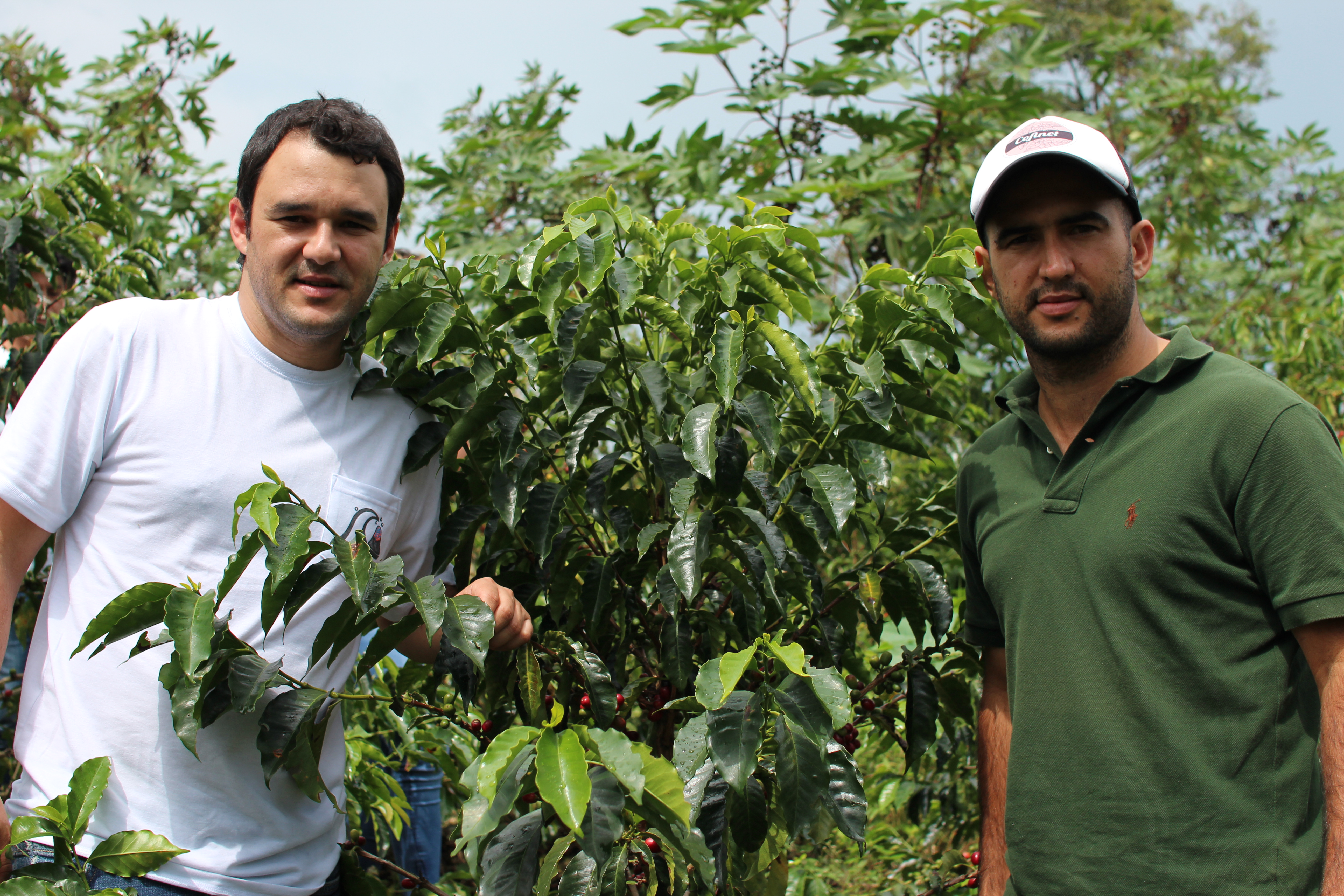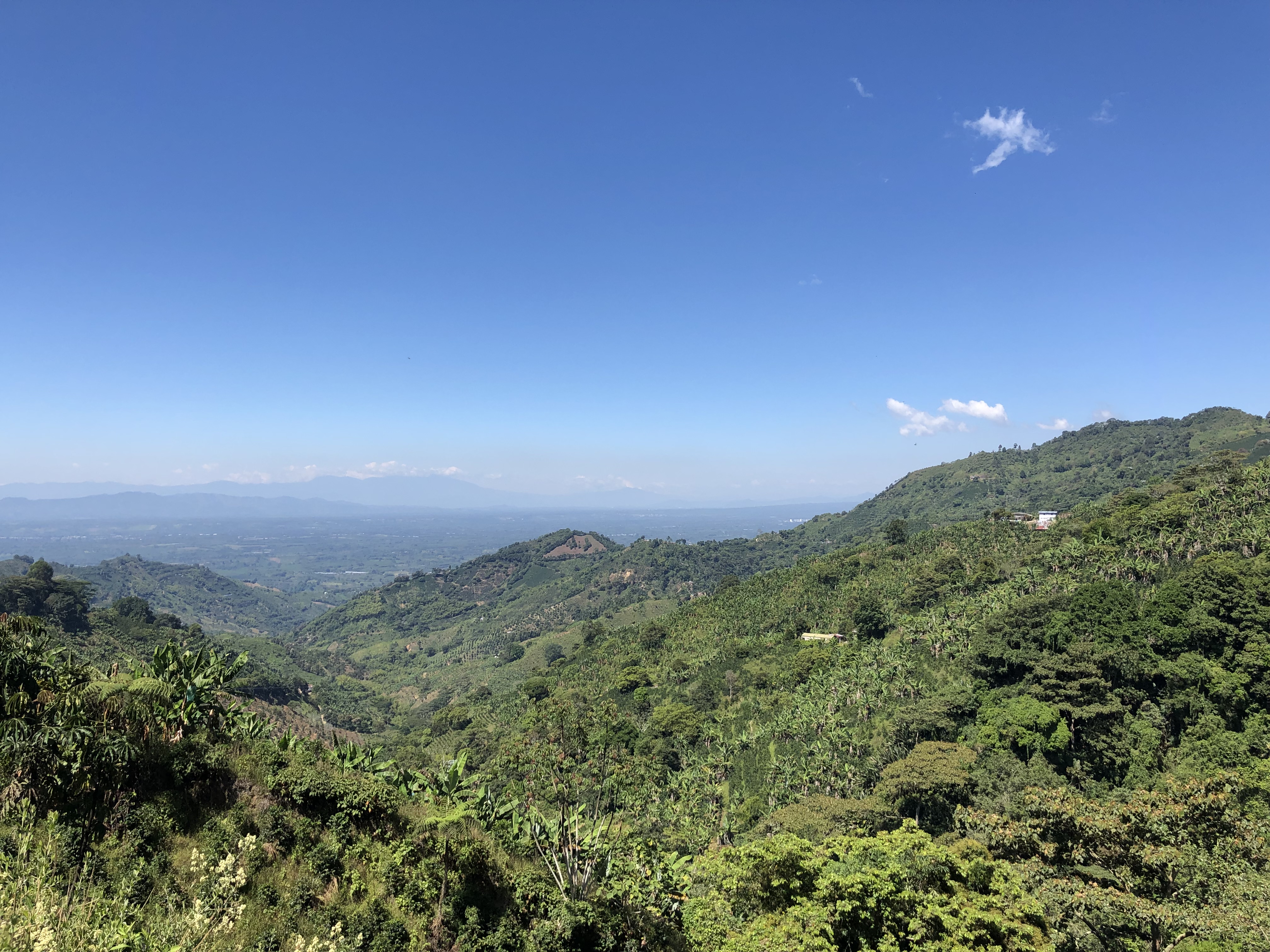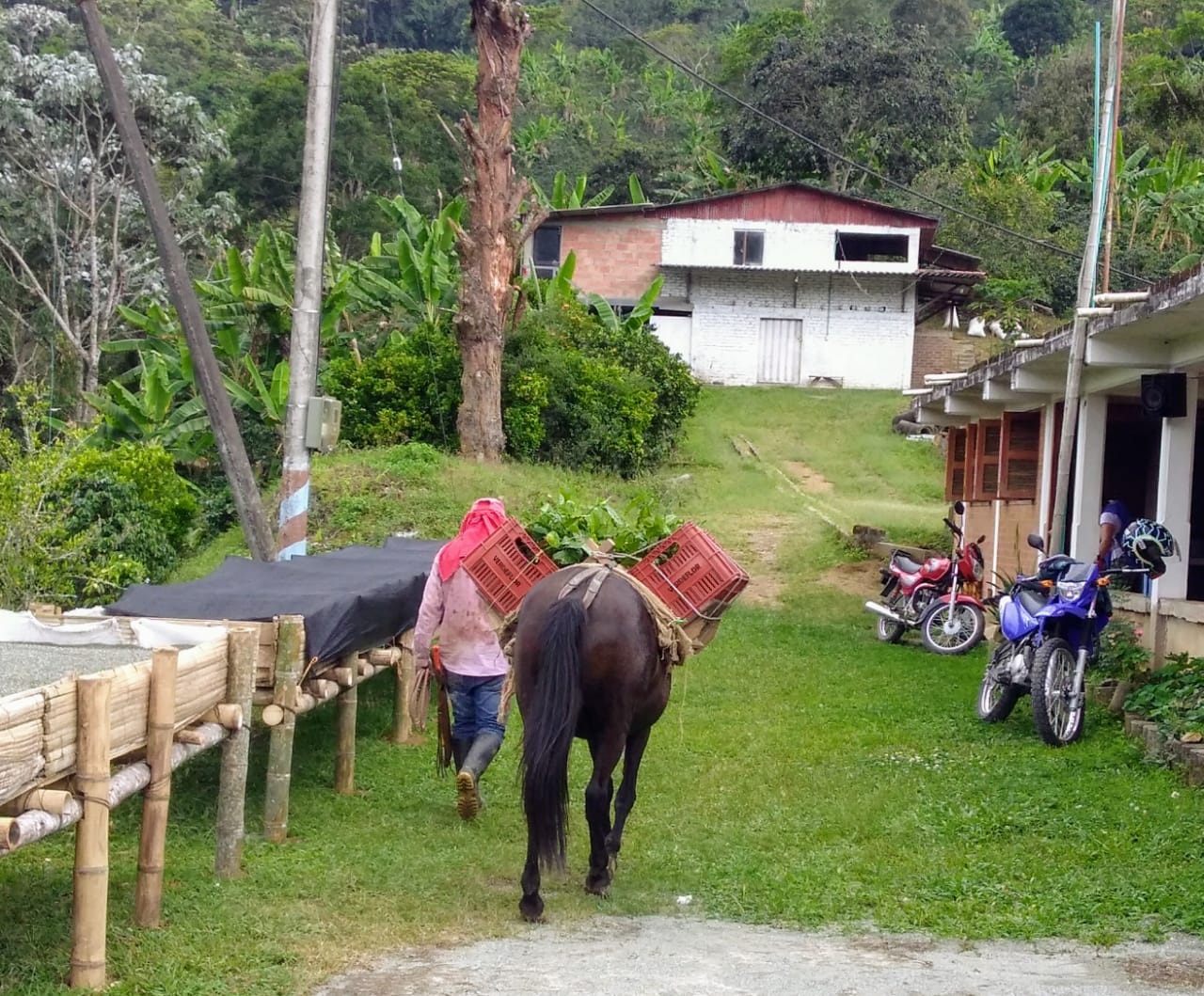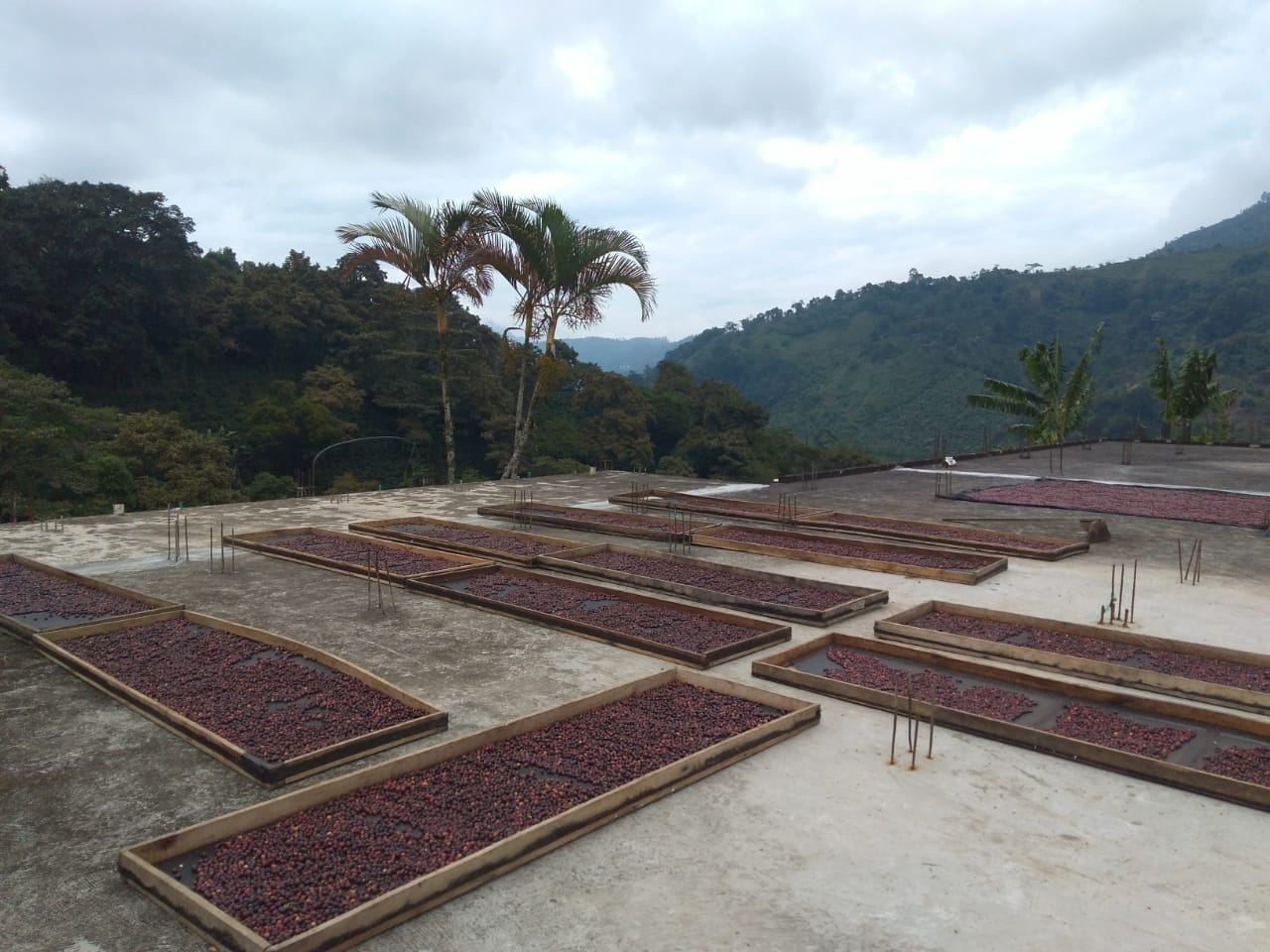-
Producer
-
Felipe Arcila
-
Country
- Colombia
-
Region
-
Quindio
-
Altitude
-
1700-1900m above sea level
-
Variety
-
Process
-
Importer
-
Cofinet
-
Body
-
Light
-
Acidity
-
Balanced
-
Tasting notes
-
Musk stick, jasmine, ripe white peach
-
Roast style
Colombia
Jardines Del Eden
Red GeshaWhen we tasted the sample of this coffee on our cupping table, it felt like something remarkable. Clean, delicate, structured, floral—no doubt one of the top-tier lots in our Very Special category. It reminds us of musk stick, jasmine, ripe white peach.
Very special
This VS edition is a semi-throwback. Back in July 2022, we shared a natural Yellow Gesha from Jardines del Edén (Colombia); this lot comes back to the same farm, but, instead, it features a washed Red Gesha.
When we tasted this sample at our cupping table, we knew straight away it belonged in our Very Special section. Aside from having a top-tier price tag, the cup’s presence is remarkable. Clean, floral, balanced, structured… The elevated care put on production, plus the natural qualities of the Gesha variety, really come through.
About the Arcilas
Felipe Arcila is one of the co-founders of Cofinet (a Colombian-based coffee import/export company( along with his brother Carlos. They are the 4th generation of coffee growers. Their father, Jairo, is a third-generation coffee grower from Quindío.
Jairo told his sons that the coffee industry was not profitable because of the many economic challenges he had faced in the past. Because of this advice, Felipe and Carlos both pushed forward with their careers in civil engineering and travelled to Australia to continue with their master’s degrees.
Felipe was amazed by the coffee culture he saw first-hand in Australia and was inspired to be a part of it. When Felipe finished his studies and returned to Colombia, he became more involved in coffee and started to study Specialty Coffee. Felipe and Carlos then bought Jardines del Edén, where their focus is on growing exotic varieties of coffee.
In 2015, Felipe and Carlos started Cofinet and began producing, sourcing, and exporting Specialty Coffee to the rest of the world.

While Carlos Arcila (left) is the Australian connection to Cofinet, his brother Felipe works on the ground in Colombia.
About the farm, Jardines del Edén
This coffee comes from a farm owned and operated by Cofinet, an Australian-Colombian coffee importing company we’ve worked with for years. Growing their own coffee was always part of their plans—or dreams— and this way they get to have a complete experience throughout the whole coffee chain.
It’s their first farm, but not the last (they already purchased a second one, Jardines del Encanto). They picked Jardines del Eden because of its phenomenal soil conditions, unusual cold microclimate (perfect for growing high-quality coffee) and unique biodiversity (plenty of native birds, one small waterfall and 3 water springs that feed their processing operations).
JdE serves almost like a lab where they can experiment and produce the coffee perhaps they don’t often access through the general market—and also helps them understand the pains and limitations faced by farmers. Here, they planted 14 of the best coffee tree varieties.

A view from the top of Jardines del Eden.
The Red Gesha variety
In 1931, the British Ambassador of Ethiopia collected seeds near the village of Gesha to use for research purposes. From there, the coffee seeds journeyed to Kenya, Uganda, Tanzania, and finally to Panama, being recognized for tolerance to coffee leaf rust. However, the plant’s branches were brittle and not favoured by farmers so it was not widely planted.
The coffee came to prominence in 2005 when the Peterson family of Hacienda La Esmeralda (Boquete, Panama), entered it into the “Best of Panama” competition and auction. It received exceptionally high marks and broke the then-record for green coffee auction prices, selling for over $20/pound.
Gesha, also spelled Geisha, is associated with extremely high cup quality when the plants are managed well at high altitude, and is known for its delicate floral, jasmine, and peach-like aromas.
Red Gesha trees produce red coffee cherries, hence the name. “We planted this variety [Gesha] in 2019, and the results have been successful! The soil and altitude of Jardines del Eden allow for the production of a sweet, floral, and complex profile,” says Felipe.
(Sources: World Coffee Research, Trabocca, SCA)
Harvest and processing
Christian, the farm manager, employs biodynamic principles for the growth and production of the coffee at Jardines del Eden—i.e. avoiding the use of fertilizers.
The cherries in this lot were harvested following strict ripeness criteria, floated, and hand-sorted to remove any defects. These were then exposed to 30 hours of underwater fermentation before being pulped. The parchment was then gently washed and dried for ~183 hours in temperature-controlled conditions until ideal moisture content was achieved.

One of Christian’s best workmates!

The dry beds.
Brew, share, enjoy
Now you know a bit more about the background it’s time to enjoy this awesome coffee! If you don’t know where to start, you can use the team’s brewing recipe (see below on this page).
You can also try your favourite method (check our brew guides if you need assistance/inspiration) and play around with some settings to get the best of it.
Don’t forget to tell us how it went, perhaps adding your recipe here, via email or on Instagram at @samplecoffee. We look forward to hearing about your experience with this VS coffee!
Learn everything about this coffee:
Ethical, traceable sourcing
This page has all the sourcing information (variety, process, region, story, importer, and more) that our importers share with us, and give us permission to use.
The transparency helps us talk confidently about the quality and background of our product, and it helps you know exactly what you’re buying.
Learn more:
Coffee page transparency legend
Our coffee philosophy
Our business approach
Fresh harvest coffee
We only source and roast coffee from each country’s latest harvest season (so the green coffee is never older than 1 year from the time of picking, processing and packing). This ensures the sensory qualities are always at their peak and unaffected by excessive ageing.
Roasted for espresso and filter (best enjoyed black)
Roast style: omni. Omni roasts are designed to brew and taste great both as espresso and filter. Our omni single origins generally sit on Agtron values in the ~70-60 value range. So, technically, they are somewhere in the lighter side of the medium spectrum.
Designed for espresso and filter brewing. Best enjoyed black.
Learn more:
Our Loring Kestrel S35 roaster
Our roasting style and approach
Best brewed within days 15-49 post-roast
The ‘fresh is best’ saying doesn’t apply to coffee (contrary to popular belief). Waiting before opening and brewing your bag of whole coffee beans helps develop peak flavour and acidity.
But heads up: if you buy pre-ground coffee, brew it as soon as possible.
Learn more:
Our recommended brewing window
Try our custom brewing recipes
Our recipes and ratios are tailored to our coffee sourcing and roasting styles, bringing the best flavour and feel out of each coffee.
For pour over, immersion, and other filter brewing styles, check our brew guides.
For our espresso single origins, we recommend a coffee:yield ratio of 1:3:
- Dose: 20g ground coffee
- Yield: 60g espresso
- Total brew time: ~24-28 seconds
This is just a starting point! We encourage you to experiment, taste, and adjust to find the recipe that you enjoy the most.
Learn more:
Our espresso brew guide (single origin)
Brewing ratio calculator
Packaging and sustainability
- Bags: ABA-certified home compostable (AS 5810-2010)
- Labels: recyclable
- Valves (only on +250g bags): general waste
- Box and tape (online orders): recyclable
Learn more:
Our packaging
Variety
Red Gesha variety
The location
Coffee from Colombia
Colombia is one of the largest coffee producers in the world and benefits greatly from having one of the most unique and complex set of micro-climates of all coffee producing nations.
Farm processes
Washed process
Machines are used to remove the flesh from the coffee cherry before being fermented in water, washed again, and finally sun dried. This process tends to result in more distinct, cleaner flavours.

Subscribe to a world of coffee
Discover a new single origin coffee from Sample every 1-5 weeks with no delivery fees.
No up-front purchase, and you can pause, cancel, or change plans at any time.
Available to order online this week:

Peru Miguel Estela
Flavours of honeydew melon, white grape, marmalade
Body Acidity
Washed Marshell
August 2025 harvest
Roasted omni for filter and espresso
Peru Miguel Estela online
Kenya Karimikui
Flavours of blood orange, blackberry, plum jam
Body Acidity
Washed Batian, SL28, SL34, Ruiru 11
November 2024 harvest
Roasted omni for filter and espresso
Kenya Karimikui online
Rwanda Kibirizi
Flavours of mandarin, raisin, apple
Body Acidity
Washed Bourbon
June 2025 harvest
Roasted omni for filter and espresso
Rwanda Kibirizi online
Colombia Rigoberto Chavarro
Flavours of brown sugar, wine gum, candied stone fruit
Body Acidity
Washed Pink Bourbon
February 2025 harvest
Roasted omni for filter and espresso
Colombia Rigoberto Chavarro online